Auditing and Assurance: Analysis of Audit Risks and Fraud Factors
VerifiedAdded on 2019/11/20
|7
|2248
|157
Report
AI Summary
This report analyzes an auditing and assurance case study, focusing on audit planning, risk assessment, and fraud factors within a company. The analysis begins with an examination of preliminary analytical procedures and the impact of a new CEO's accounting policy changes, highlighting potential self-interest and manipulation of financial statements. It delves into specific areas of concern, including inventory valuation, depreciation, revenue recognition, and accounts receivable management. The report identifies both inherent and fraud risks, such as obsolescence of content, CEO incentives tied to performance, and the potential for misrepresentation in financial reporting. It discusses the impact of these risks on audit procedures and the need for auditors to scrutinize accounting policy changes, seek justification from management, and consider issuing qualified opinions if necessary. The report emphasizes the importance of understanding the company's financial statements, assessing management's motivations, and applying appropriate audit procedures to mitigate identified risks.
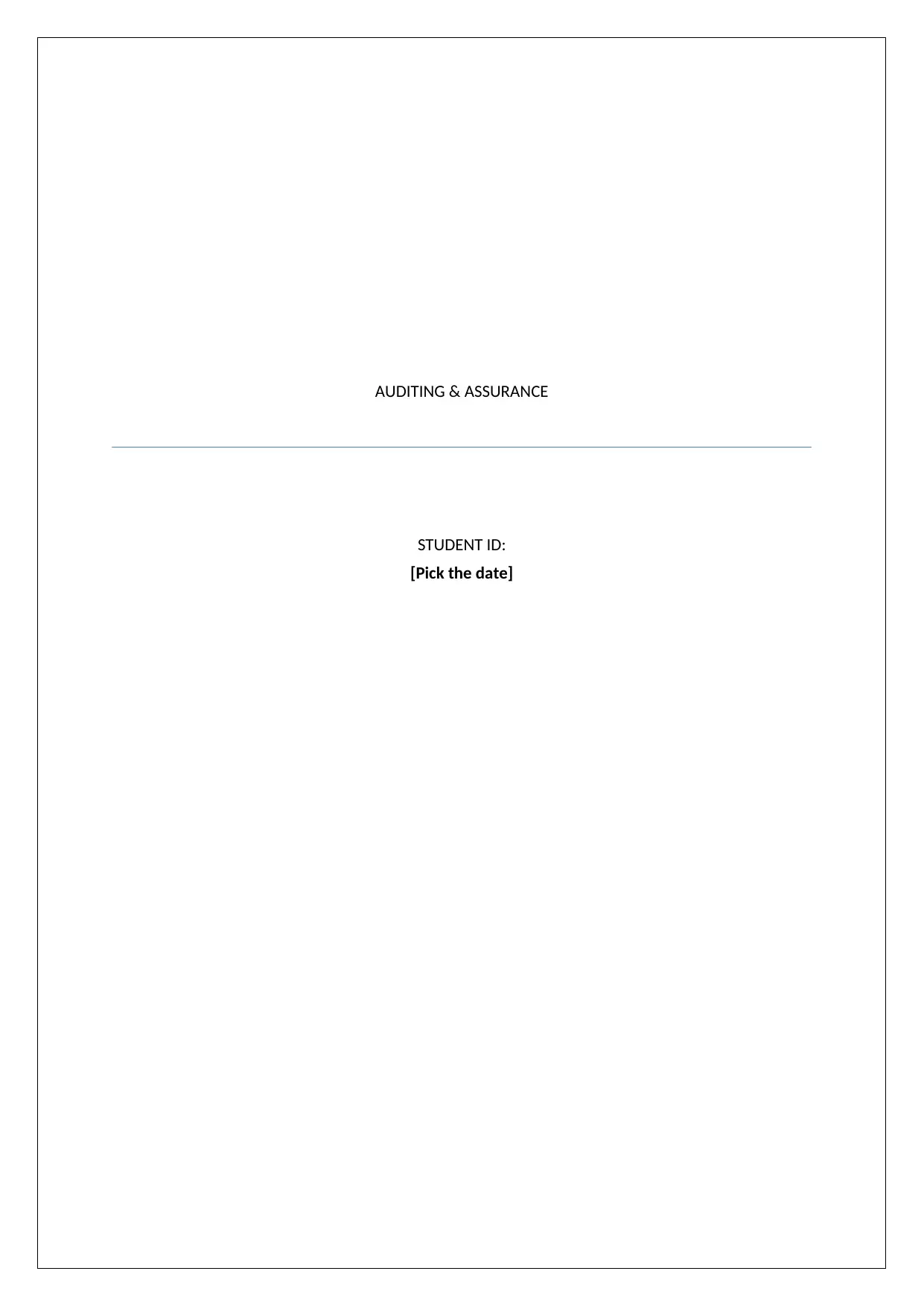
AUDITING & ASSURANCE
STUDENT ID:
[Pick the date]
STUDENT ID:
[Pick the date]
Paraphrase This Document
Need a fresh take? Get an instant paraphrase of this document with our AI Paraphraser
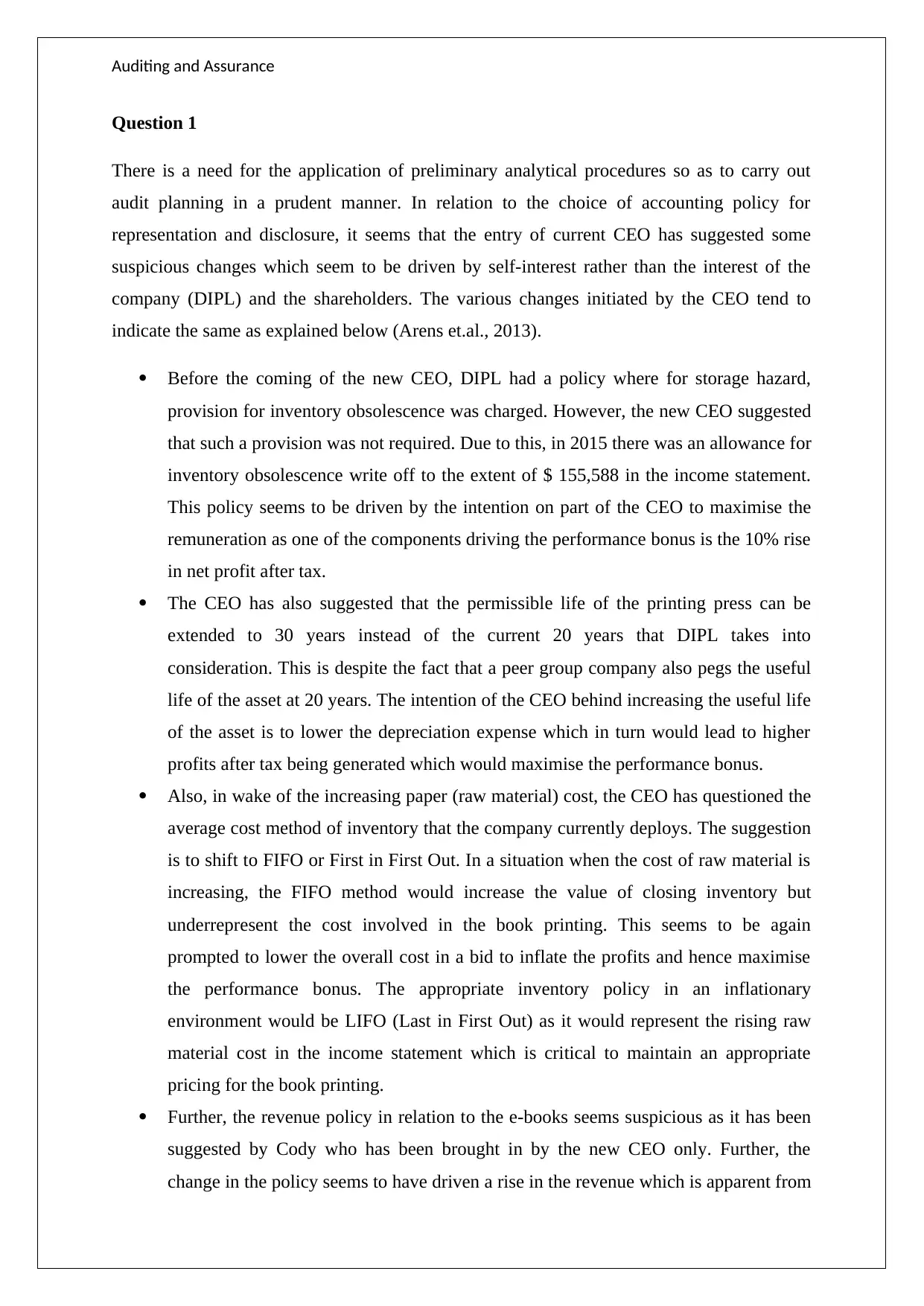
Auditing and Assurance
Question 1
There is a need for the application of preliminary analytical procedures so as to carry out
audit planning in a prudent manner. In relation to the choice of accounting policy for
representation and disclosure, it seems that the entry of current CEO has suggested some
suspicious changes which seem to be driven by self-interest rather than the interest of the
company (DIPL) and the shareholders. The various changes initiated by the CEO tend to
indicate the same as explained below (Arens et.al., 2013).
Before the coming of the new CEO, DIPL had a policy where for storage hazard,
provision for inventory obsolescence was charged. However, the new CEO suggested
that such a provision was not required. Due to this, in 2015 there was an allowance for
inventory obsolescence write off to the extent of $ 155,588 in the income statement.
This policy seems to be driven by the intention on part of the CEO to maximise the
remuneration as one of the components driving the performance bonus is the 10% rise
in net profit after tax.
The CEO has also suggested that the permissible life of the printing press can be
extended to 30 years instead of the current 20 years that DIPL takes into
consideration. This is despite the fact that a peer group company also pegs the useful
life of the asset at 20 years. The intention of the CEO behind increasing the useful life
of the asset is to lower the depreciation expense which in turn would lead to higher
profits after tax being generated which would maximise the performance bonus.
Also, in wake of the increasing paper (raw material) cost, the CEO has questioned the
average cost method of inventory that the company currently deploys. The suggestion
is to shift to FIFO or First in First Out. In a situation when the cost of raw material is
increasing, the FIFO method would increase the value of closing inventory but
underrepresent the cost involved in the book printing. This seems to be again
prompted to lower the overall cost in a bid to inflate the profits and hence maximise
the performance bonus. The appropriate inventory policy in an inflationary
environment would be LIFO (Last in First Out) as it would represent the rising raw
material cost in the income statement which is critical to maintain an appropriate
pricing for the book printing.
Further, the revenue policy in relation to the e-books seems suspicious as it has been
suggested by Cody who has been brought in by the new CEO only. Further, the
change in the policy seems to have driven a rise in the revenue which is apparent from
Question 1
There is a need for the application of preliminary analytical procedures so as to carry out
audit planning in a prudent manner. In relation to the choice of accounting policy for
representation and disclosure, it seems that the entry of current CEO has suggested some
suspicious changes which seem to be driven by self-interest rather than the interest of the
company (DIPL) and the shareholders. The various changes initiated by the CEO tend to
indicate the same as explained below (Arens et.al., 2013).
Before the coming of the new CEO, DIPL had a policy where for storage hazard,
provision for inventory obsolescence was charged. However, the new CEO suggested
that such a provision was not required. Due to this, in 2015 there was an allowance for
inventory obsolescence write off to the extent of $ 155,588 in the income statement.
This policy seems to be driven by the intention on part of the CEO to maximise the
remuneration as one of the components driving the performance bonus is the 10% rise
in net profit after tax.
The CEO has also suggested that the permissible life of the printing press can be
extended to 30 years instead of the current 20 years that DIPL takes into
consideration. This is despite the fact that a peer group company also pegs the useful
life of the asset at 20 years. The intention of the CEO behind increasing the useful life
of the asset is to lower the depreciation expense which in turn would lead to higher
profits after tax being generated which would maximise the performance bonus.
Also, in wake of the increasing paper (raw material) cost, the CEO has questioned the
average cost method of inventory that the company currently deploys. The suggestion
is to shift to FIFO or First in First Out. In a situation when the cost of raw material is
increasing, the FIFO method would increase the value of closing inventory but
underrepresent the cost involved in the book printing. This seems to be again
prompted to lower the overall cost in a bid to inflate the profits and hence maximise
the performance bonus. The appropriate inventory policy in an inflationary
environment would be LIFO (Last in First Out) as it would represent the rising raw
material cost in the income statement which is critical to maintain an appropriate
pricing for the book printing.
Further, the revenue policy in relation to the e-books seems suspicious as it has been
suggested by Cody who has been brought in by the new CEO only. Further, the
change in the policy seems to have driven a rise in the revenue which is apparent from
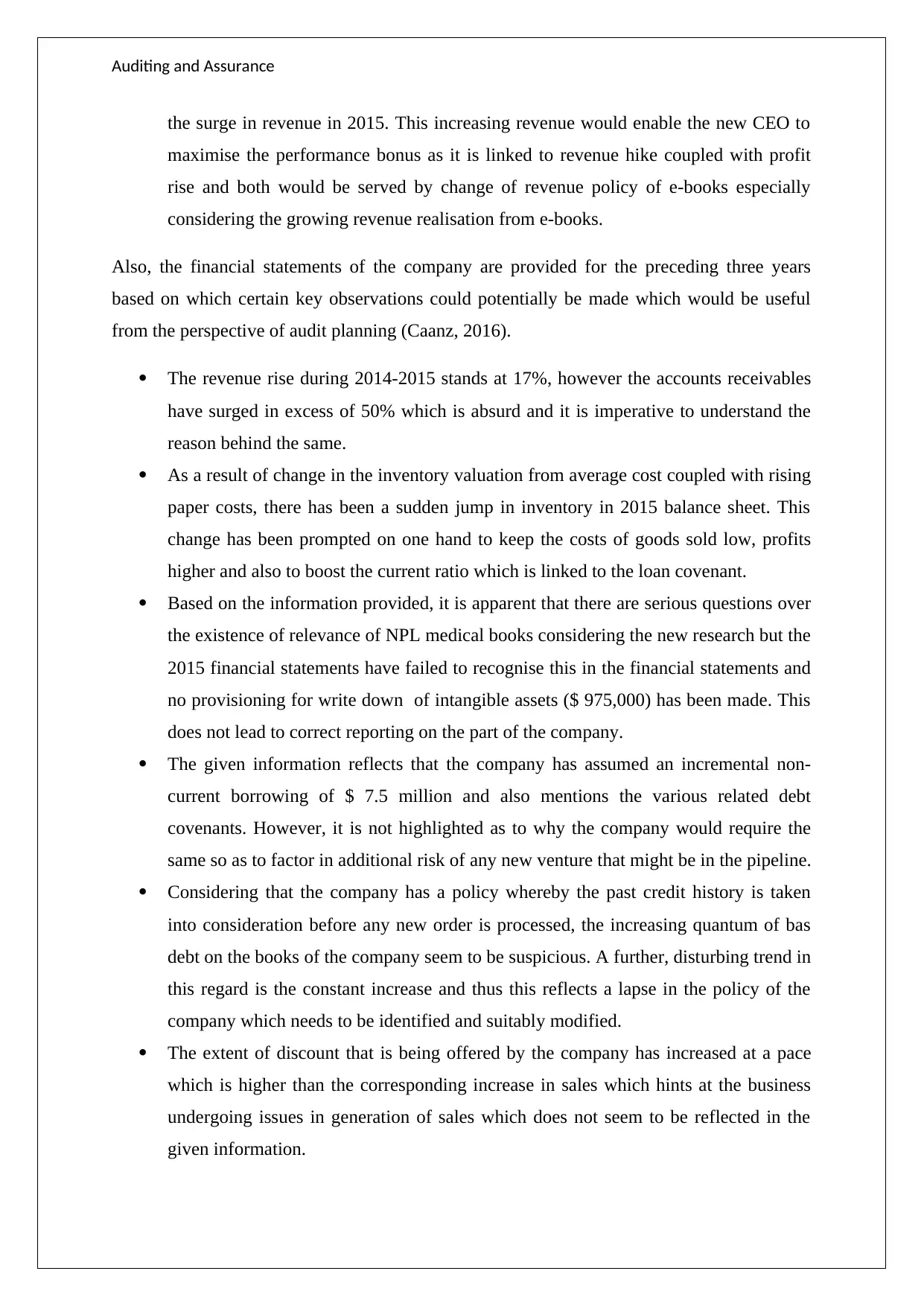
Auditing and Assurance
the surge in revenue in 2015. This increasing revenue would enable the new CEO to
maximise the performance bonus as it is linked to revenue hike coupled with profit
rise and both would be served by change of revenue policy of e-books especially
considering the growing revenue realisation from e-books.
Also, the financial statements of the company are provided for the preceding three years
based on which certain key observations could potentially be made which would be useful
from the perspective of audit planning (Caanz, 2016).
The revenue rise during 2014-2015 stands at 17%, however the accounts receivables
have surged in excess of 50% which is absurd and it is imperative to understand the
reason behind the same.
As a result of change in the inventory valuation from average cost coupled with rising
paper costs, there has been a sudden jump in inventory in 2015 balance sheet. This
change has been prompted on one hand to keep the costs of goods sold low, profits
higher and also to boost the current ratio which is linked to the loan covenant.
Based on the information provided, it is apparent that there are serious questions over
the existence of relevance of NPL medical books considering the new research but the
2015 financial statements have failed to recognise this in the financial statements and
no provisioning for write down of intangible assets ($ 975,000) has been made. This
does not lead to correct reporting on the part of the company.
The given information reflects that the company has assumed an incremental non-
current borrowing of $ 7.5 million and also mentions the various related debt
covenants. However, it is not highlighted as to why the company would require the
same so as to factor in additional risk of any new venture that might be in the pipeline.
Considering that the company has a policy whereby the past credit history is taken
into consideration before any new order is processed, the increasing quantum of bas
debt on the books of the company seem to be suspicious. A further, disturbing trend in
this regard is the constant increase and thus this reflects a lapse in the policy of the
company which needs to be identified and suitably modified.
The extent of discount that is being offered by the company has increased at a pace
which is higher than the corresponding increase in sales which hints at the business
undergoing issues in generation of sales which does not seem to be reflected in the
given information.
the surge in revenue in 2015. This increasing revenue would enable the new CEO to
maximise the performance bonus as it is linked to revenue hike coupled with profit
rise and both would be served by change of revenue policy of e-books especially
considering the growing revenue realisation from e-books.
Also, the financial statements of the company are provided for the preceding three years
based on which certain key observations could potentially be made which would be useful
from the perspective of audit planning (Caanz, 2016).
The revenue rise during 2014-2015 stands at 17%, however the accounts receivables
have surged in excess of 50% which is absurd and it is imperative to understand the
reason behind the same.
As a result of change in the inventory valuation from average cost coupled with rising
paper costs, there has been a sudden jump in inventory in 2015 balance sheet. This
change has been prompted on one hand to keep the costs of goods sold low, profits
higher and also to boost the current ratio which is linked to the loan covenant.
Based on the information provided, it is apparent that there are serious questions over
the existence of relevance of NPL medical books considering the new research but the
2015 financial statements have failed to recognise this in the financial statements and
no provisioning for write down of intangible assets ($ 975,000) has been made. This
does not lead to correct reporting on the part of the company.
The given information reflects that the company has assumed an incremental non-
current borrowing of $ 7.5 million and also mentions the various related debt
covenants. However, it is not highlighted as to why the company would require the
same so as to factor in additional risk of any new venture that might be in the pipeline.
Considering that the company has a policy whereby the past credit history is taken
into consideration before any new order is processed, the increasing quantum of bas
debt on the books of the company seem to be suspicious. A further, disturbing trend in
this regard is the constant increase and thus this reflects a lapse in the policy of the
company which needs to be identified and suitably modified.
The extent of discount that is being offered by the company has increased at a pace
which is higher than the corresponding increase in sales which hints at the business
undergoing issues in generation of sales which does not seem to be reflected in the
given information.
⊘ This is a preview!⊘
Do you want full access?
Subscribe today to unlock all pages.

Trusted by 1+ million students worldwide
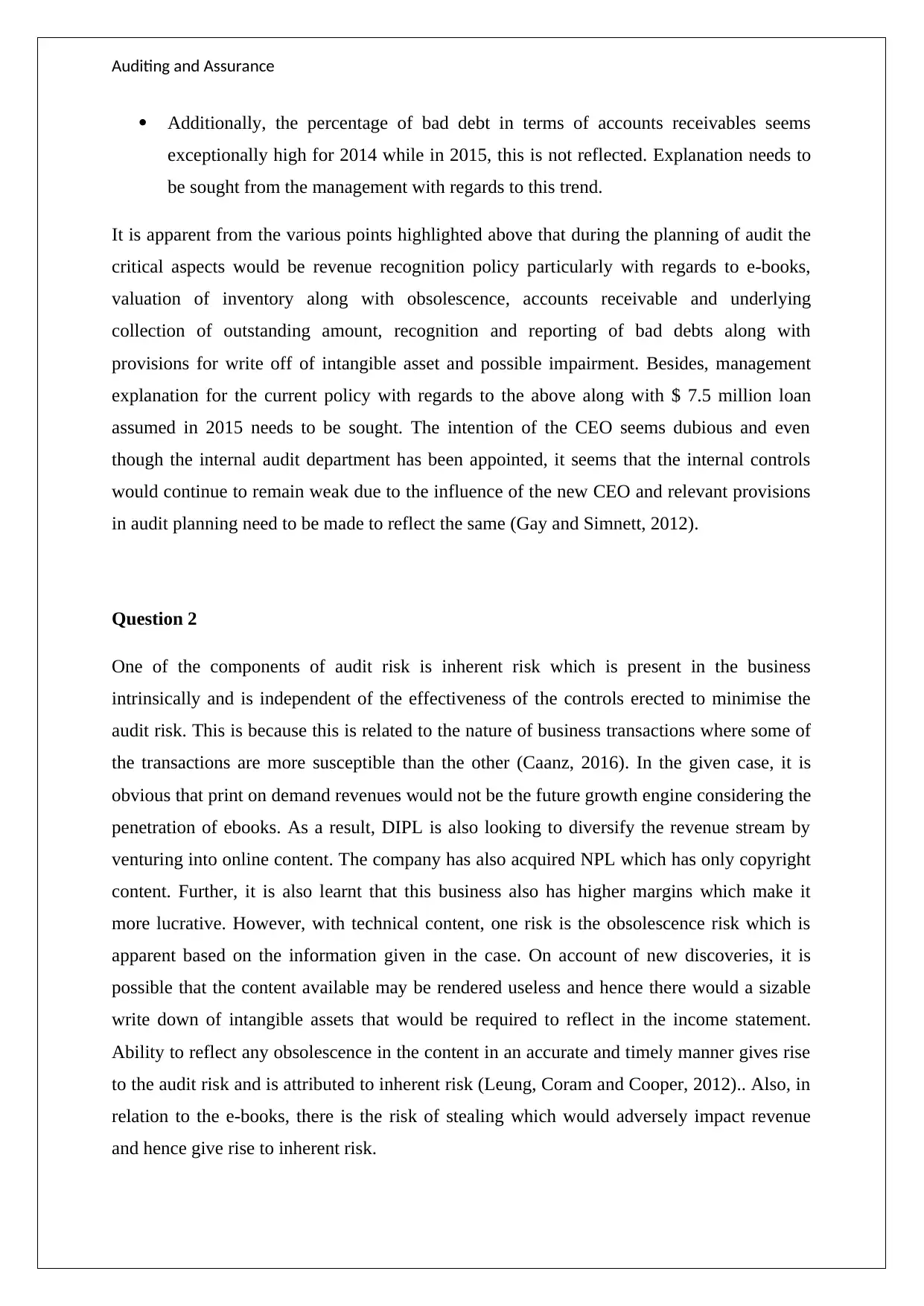
Auditing and Assurance
Additionally, the percentage of bad debt in terms of accounts receivables seems
exceptionally high for 2014 while in 2015, this is not reflected. Explanation needs to
be sought from the management with regards to this trend.
It is apparent from the various points highlighted above that during the planning of audit the
critical aspects would be revenue recognition policy particularly with regards to e-books,
valuation of inventory along with obsolescence, accounts receivable and underlying
collection of outstanding amount, recognition and reporting of bad debts along with
provisions for write off of intangible asset and possible impairment. Besides, management
explanation for the current policy with regards to the above along with $ 7.5 million loan
assumed in 2015 needs to be sought. The intention of the CEO seems dubious and even
though the internal audit department has been appointed, it seems that the internal controls
would continue to remain weak due to the influence of the new CEO and relevant provisions
in audit planning need to be made to reflect the same (Gay and Simnett, 2012).
Question 2
One of the components of audit risk is inherent risk which is present in the business
intrinsically and is independent of the effectiveness of the controls erected to minimise the
audit risk. This is because this is related to the nature of business transactions where some of
the transactions are more susceptible than the other (Caanz, 2016). In the given case, it is
obvious that print on demand revenues would not be the future growth engine considering the
penetration of ebooks. As a result, DIPL is also looking to diversify the revenue stream by
venturing into online content. The company has also acquired NPL which has only copyright
content. Further, it is also learnt that this business also has higher margins which make it
more lucrative. However, with technical content, one risk is the obsolescence risk which is
apparent based on the information given in the case. On account of new discoveries, it is
possible that the content available may be rendered useless and hence there would a sizable
write down of intangible assets that would be required to reflect in the income statement.
Ability to reflect any obsolescence in the content in an accurate and timely manner gives rise
to the audit risk and is attributed to inherent risk (Leung, Coram and Cooper, 2012).. Also, in
relation to the e-books, there is the risk of stealing which would adversely impact revenue
and hence give rise to inherent risk.
Additionally, the percentage of bad debt in terms of accounts receivables seems
exceptionally high for 2014 while in 2015, this is not reflected. Explanation needs to
be sought from the management with regards to this trend.
It is apparent from the various points highlighted above that during the planning of audit the
critical aspects would be revenue recognition policy particularly with regards to e-books,
valuation of inventory along with obsolescence, accounts receivable and underlying
collection of outstanding amount, recognition and reporting of bad debts along with
provisions for write off of intangible asset and possible impairment. Besides, management
explanation for the current policy with regards to the above along with $ 7.5 million loan
assumed in 2015 needs to be sought. The intention of the CEO seems dubious and even
though the internal audit department has been appointed, it seems that the internal controls
would continue to remain weak due to the influence of the new CEO and relevant provisions
in audit planning need to be made to reflect the same (Gay and Simnett, 2012).
Question 2
One of the components of audit risk is inherent risk which is present in the business
intrinsically and is independent of the effectiveness of the controls erected to minimise the
audit risk. This is because this is related to the nature of business transactions where some of
the transactions are more susceptible than the other (Caanz, 2016). In the given case, it is
obvious that print on demand revenues would not be the future growth engine considering the
penetration of ebooks. As a result, DIPL is also looking to diversify the revenue stream by
venturing into online content. The company has also acquired NPL which has only copyright
content. Further, it is also learnt that this business also has higher margins which make it
more lucrative. However, with technical content, one risk is the obsolescence risk which is
apparent based on the information given in the case. On account of new discoveries, it is
possible that the content available may be rendered useless and hence there would a sizable
write down of intangible assets that would be required to reflect in the income statement.
Ability to reflect any obsolescence in the content in an accurate and timely manner gives rise
to the audit risk and is attributed to inherent risk (Leung, Coram and Cooper, 2012).. Also, in
relation to the e-books, there is the risk of stealing which would adversely impact revenue
and hence give rise to inherent risk.
Paraphrase This Document
Need a fresh take? Get an instant paraphrase of this document with our AI Paraphraser
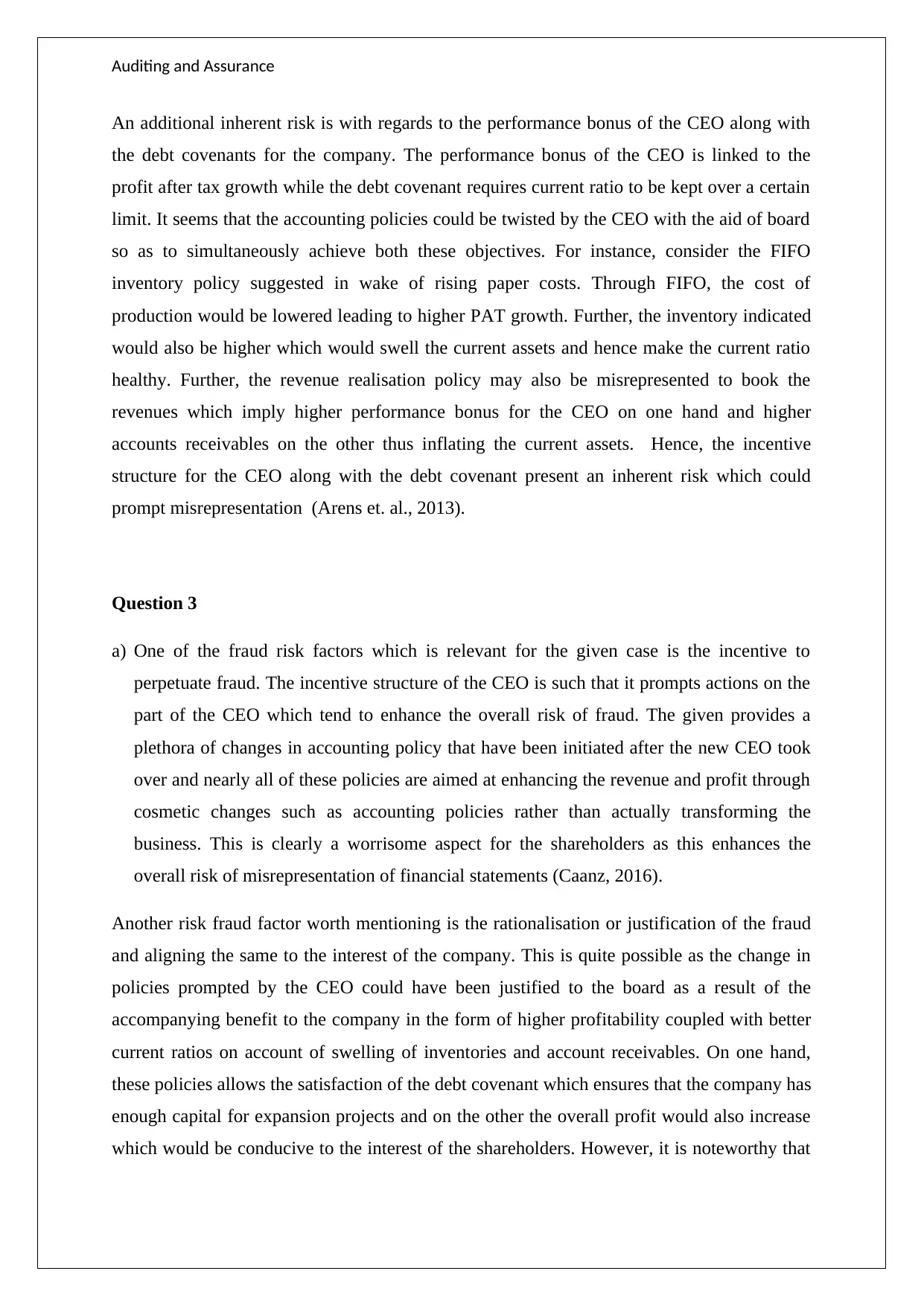
Auditing and Assurance
An additional inherent risk is with regards to the performance bonus of the CEO along with
the debt covenants for the company. The performance bonus of the CEO is linked to the
profit after tax growth while the debt covenant requires current ratio to be kept over a certain
limit. It seems that the accounting policies could be twisted by the CEO with the aid of board
so as to simultaneously achieve both these objectives. For instance, consider the FIFO
inventory policy suggested in wake of rising paper costs. Through FIFO, the cost of
production would be lowered leading to higher PAT growth. Further, the inventory indicated
would also be higher which would swell the current assets and hence make the current ratio
healthy. Further, the revenue realisation policy may also be misrepresented to book the
revenues which imply higher performance bonus for the CEO on one hand and higher
accounts receivables on the other thus inflating the current assets. Hence, the incentive
structure for the CEO along with the debt covenant present an inherent risk which could
prompt misrepresentation (Arens et. al., 2013).
Question 3
a) One of the fraud risk factors which is relevant for the given case is the incentive to
perpetuate fraud. The incentive structure of the CEO is such that it prompts actions on the
part of the CEO which tend to enhance the overall risk of fraud. The given provides a
plethora of changes in accounting policy that have been initiated after the new CEO took
over and nearly all of these policies are aimed at enhancing the revenue and profit through
cosmetic changes such as accounting policies rather than actually transforming the
business. This is clearly a worrisome aspect for the shareholders as this enhances the
overall risk of misrepresentation of financial statements (Caanz, 2016).
Another risk fraud factor worth mentioning is the rationalisation or justification of the fraud
and aligning the same to the interest of the company. This is quite possible as the change in
policies prompted by the CEO could have been justified to the board as a result of the
accompanying benefit to the company in the form of higher profitability coupled with better
current ratios on account of swelling of inventories and account receivables. On one hand,
these policies allows the satisfaction of the debt covenant which ensures that the company has
enough capital for expansion projects and on the other the overall profit would also increase
which would be conducive to the interest of the shareholders. However, it is noteworthy that
An additional inherent risk is with regards to the performance bonus of the CEO along with
the debt covenants for the company. The performance bonus of the CEO is linked to the
profit after tax growth while the debt covenant requires current ratio to be kept over a certain
limit. It seems that the accounting policies could be twisted by the CEO with the aid of board
so as to simultaneously achieve both these objectives. For instance, consider the FIFO
inventory policy suggested in wake of rising paper costs. Through FIFO, the cost of
production would be lowered leading to higher PAT growth. Further, the inventory indicated
would also be higher which would swell the current assets and hence make the current ratio
healthy. Further, the revenue realisation policy may also be misrepresented to book the
revenues which imply higher performance bonus for the CEO on one hand and higher
accounts receivables on the other thus inflating the current assets. Hence, the incentive
structure for the CEO along with the debt covenant present an inherent risk which could
prompt misrepresentation (Arens et. al., 2013).
Question 3
a) One of the fraud risk factors which is relevant for the given case is the incentive to
perpetuate fraud. The incentive structure of the CEO is such that it prompts actions on the
part of the CEO which tend to enhance the overall risk of fraud. The given provides a
plethora of changes in accounting policy that have been initiated after the new CEO took
over and nearly all of these policies are aimed at enhancing the revenue and profit through
cosmetic changes such as accounting policies rather than actually transforming the
business. This is clearly a worrisome aspect for the shareholders as this enhances the
overall risk of misrepresentation of financial statements (Caanz, 2016).
Another risk fraud factor worth mentioning is the rationalisation or justification of the fraud
and aligning the same to the interest of the company. This is quite possible as the change in
policies prompted by the CEO could have been justified to the board as a result of the
accompanying benefit to the company in the form of higher profitability coupled with better
current ratios on account of swelling of inventories and account receivables. On one hand,
these policies allows the satisfaction of the debt covenant which ensures that the company has
enough capital for expansion projects and on the other the overall profit would also increase
which would be conducive to the interest of the shareholders. However, it is noteworthy that
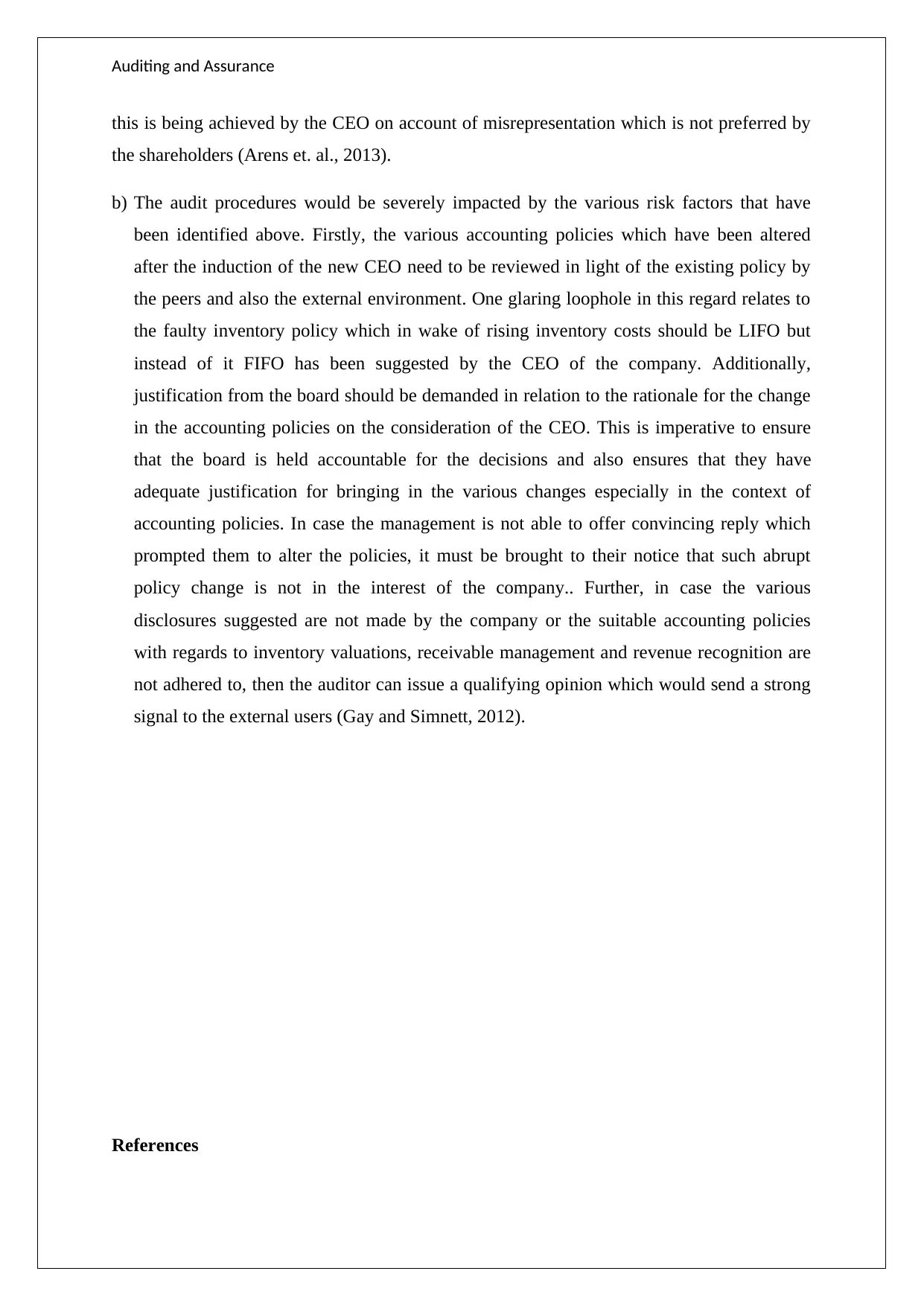
Auditing and Assurance
this is being achieved by the CEO on account of misrepresentation which is not preferred by
the shareholders (Arens et. al., 2013).
b) The audit procedures would be severely impacted by the various risk factors that have
been identified above. Firstly, the various accounting policies which have been altered
after the induction of the new CEO need to be reviewed in light of the existing policy by
the peers and also the external environment. One glaring loophole in this regard relates to
the faulty inventory policy which in wake of rising inventory costs should be LIFO but
instead of it FIFO has been suggested by the CEO of the company. Additionally,
justification from the board should be demanded in relation to the rationale for the change
in the accounting policies on the consideration of the CEO. This is imperative to ensure
that the board is held accountable for the decisions and also ensures that they have
adequate justification for bringing in the various changes especially in the context of
accounting policies. In case the management is not able to offer convincing reply which
prompted them to alter the policies, it must be brought to their notice that such abrupt
policy change is not in the interest of the company.. Further, in case the various
disclosures suggested are not made by the company or the suitable accounting policies
with regards to inventory valuations, receivable management and revenue recognition are
not adhered to, then the auditor can issue a qualifying opinion which would send a strong
signal to the external users (Gay and Simnett, 2012).
References
this is being achieved by the CEO on account of misrepresentation which is not preferred by
the shareholders (Arens et. al., 2013).
b) The audit procedures would be severely impacted by the various risk factors that have
been identified above. Firstly, the various accounting policies which have been altered
after the induction of the new CEO need to be reviewed in light of the existing policy by
the peers and also the external environment. One glaring loophole in this regard relates to
the faulty inventory policy which in wake of rising inventory costs should be LIFO but
instead of it FIFO has been suggested by the CEO of the company. Additionally,
justification from the board should be demanded in relation to the rationale for the change
in the accounting policies on the consideration of the CEO. This is imperative to ensure
that the board is held accountable for the decisions and also ensures that they have
adequate justification for bringing in the various changes especially in the context of
accounting policies. In case the management is not able to offer convincing reply which
prompted them to alter the policies, it must be brought to their notice that such abrupt
policy change is not in the interest of the company.. Further, in case the various
disclosures suggested are not made by the company or the suitable accounting policies
with regards to inventory valuations, receivable management and revenue recognition are
not adhered to, then the auditor can issue a qualifying opinion which would send a strong
signal to the external users (Gay and Simnett, 2012).
References
⊘ This is a preview!⊘
Do you want full access?
Subscribe today to unlock all pages.

Trusted by 1+ million students worldwide
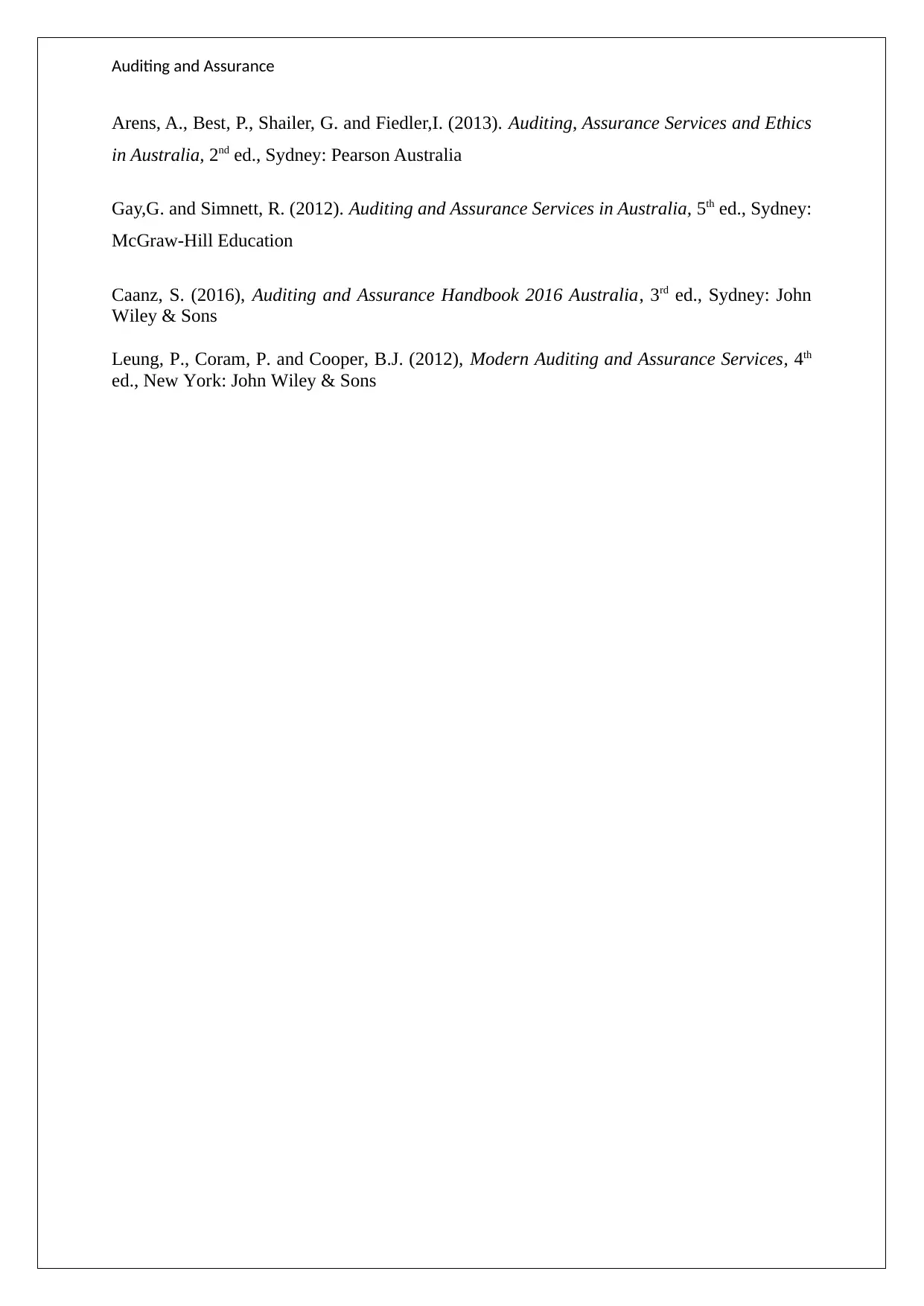
Auditing and Assurance
Arens, A., Best, P., Shailer, G. and Fiedler,I. (2013). Auditing, Assurance Services and Ethics
in Australia, 2nd ed., Sydney: Pearson Australia
Gay,G. and Simnett, R. (2012). Auditing and Assurance Services in Australia, 5th ed., Sydney:
McGraw-Hill Education
Caanz, S. (2016), Auditing and Assurance Handbook 2016 Australia, 3rd ed., Sydney: John
Wiley & Sons
Leung, P., Coram, P. and Cooper, B.J. (2012), Modern Auditing and Assurance Services, 4th
ed., New York: John Wiley & Sons
Arens, A., Best, P., Shailer, G. and Fiedler,I. (2013). Auditing, Assurance Services and Ethics
in Australia, 2nd ed., Sydney: Pearson Australia
Gay,G. and Simnett, R. (2012). Auditing and Assurance Services in Australia, 5th ed., Sydney:
McGraw-Hill Education
Caanz, S. (2016), Auditing and Assurance Handbook 2016 Australia, 3rd ed., Sydney: John
Wiley & Sons
Leung, P., Coram, P. and Cooper, B.J. (2012), Modern Auditing and Assurance Services, 4th
ed., New York: John Wiley & Sons
1 out of 7
Your All-in-One AI-Powered Toolkit for Academic Success.
+13062052269
info@desklib.com
Available 24*7 on WhatsApp / Email
![[object Object]](/_next/static/media/star-bottom.7253800d.svg)
Unlock your academic potential
Copyright © 2020–2026 A2Z Services. All Rights Reserved. Developed and managed by ZUCOL.


